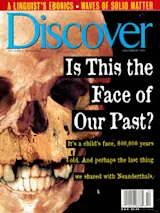To James Baldwin, writing in 1979, it was this passion, this skill . . . this incredible music. Toni Morrison, two years later, was impressed by its five present tenses and felt that the worst of all possible things that could happen would be to lose that language. What these novelists were talking about was Ebonics, the informal speech of many African Americans, which rocketed to public attention a year ago this month after the Oakland School Board approved a resolution recognizing it as the primary language of African American students.
The reaction of most people across the country--in the media, at holiday gatherings, and on electronic bulletin boards--was overwhelmingly negative. In the flash flood of e-mail on America Online, Ebonics was described as lazy English, bastardized English, poor grammar, and fractured slang. Oakland’s decision to recognize Ebonics and use it to facilitate mastery of Standard English also elicited superlatives ...














